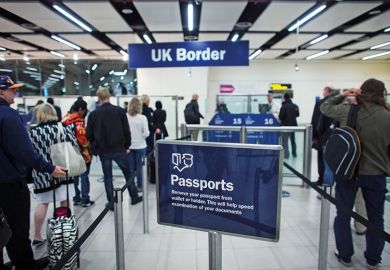Immigration rules for staff and students
The Westminster government’s Brexit White Paper on the future UK-European Union relationship makes clear that freedom of movement will end and refers to a visa system – with some exceptions. It envisages visa-free travel “for short-term business reasons”. And it says that the UK will “discuss how to facilitate temporary mobility of scientists and researchers” and other specified types of worker. The phrases “short term” and “temporary” will concern many.
Eleanor Jubb, Universities UK’s policy manager on immigration, said: “We don’t know whether universities are going to have to act as [visa] sponsors for EU nationals, both staff and students, from 2021 onwards [the end of the transition period], and what fees and tiers would apply to that if [EU nationals] had to go through the tiered [visa] system.
“And we don’t know what a short-term business visit is and how that would play out for academics, in particular.”
The White Paper also says that the UK government wants to “facilitate mobility for students and young people, enabling them to continue to benefit from world-leading universities and the cultural experiences the UK and the EU have to offer”.
Dan Hurley, UUK’s policy manager on Brexit, said: “We’re keen to ensure there is minimal disruption to [EU] student numbers regardless of the scenario. While the White Paper offers a little bit of clarity in this sense, this is an issue that might completely depend on whether the UK wants a special arrangement for EU nationals compared with non-EU nationals.
“We could have more light shed on that in the MAC reporting [Migration Advisory Committee report on the impact of overseas students] and the immigration White Paper later this year.”
Thomas Jørgensen, senior policy adviser for the European University Association, said that the question of visas is “a big issue for the UK. But…take your big neighbour, France – it’s very keen on attracting foreign talent. They might actually think that it would be a competitive advantage if Britain has visas – so that students [who are] Romanian or German or Italian, who would have gone to the UK, go to France instead. That’s one of [Emmanuel] Macron’s big points, to make France into a top tech nation.”
EU students’ fee status
Another huge issue when it comes to flows of EU students – increasingly important given Home Office limitations on non-EU recruitment and demographic decline in the younger population at home – will be whether EU students face the full fees currently paid by non-EU students in the UK.
Currently, EU students are subject to the same arrangements as home students (no fees in Scotland and fees capped at £9,250 in England, for example). Higher fees in England may act as a major deterrent for EU students, who make up nearly 6 per cent of all students at UK universities (although modelling by London Economics for the Higher Education Policy Institute suggested that some institutions might grow their EU income with higher fees).
A new policy paper by MillionPlus, the association of modern universities, says that given the vital importance of EU students the UK government “should commit to reciprocal student exchange as part of its new relationship with the EU.
“Anyone from an EU nation enrolling at a UK university should be guaranteed a new ‘European student status’ reflecting similar terms to home UK students concerning university fee levels. These terms would be reciprocated by EU nations for UK students studying on the Continent who would also pay the local fee, not revert to full ‘international student’ status.”
The MillionPlus paper, “EU students: securing the best opportunities for students, universities and the UK economy post-Brexit”, cites the Australia-New Zealand student exchange agreement, under which “New Zealand citizens are entitled to study at Australian tertiary institutions without requiring a student visa, and they are also charged domestic student fees rather than international student fees. The same is true for Australian citizens in New Zealand.”
Dave Phoenix, MillionPlus chair and London South Bank University vice-chancellor, said: “In addition to the estimated £5.1 billion these [EU] students generate for the economy, we must factor in the wider educational and cultural contribution they make, on which it would be impossible to put a price. The lack of reference to mutual EU student fee recognition in the Brexit White Paper is highly concerning and a gaping hole in Britain’s plans to exit the EU, potentially hitting hard the important two-way flow of students.”
Trade deals and student loan access
Whether EU students lose the current access that they have to the UK’s system of public student loans is another vital matter. The White Paper says that the government wants to “help students and young people to enjoy the opportunities and experiences available in the UK and the EU – in line with the arrangements that the UK might want to offer to other close trading partners in the future”.
This might allude to a long-standing idea. Times Higher Education reported last year that the UK government had discussed internally the concept of offering access to public student loans for overseas students studying at British universities, as part of potential post-Brexit trade deals with foreign governments.
Making loan access (to government-provided “commercial-style loans”) part of potential free trade agreements with foreign governments – including the EU if the UK reaches a trade deal with it – was seen as one way to avoid a dramatic drop in EU student numbers if they are charged full fees post-Brexit.
THE understands discussions on this idea are still ongoing within government.
The Japan-Australia Economic Partnership Agreement, struck in 2015, is viewed as establishing a precedent for including student loans in a trade deal. Under that agreement, “Japanese students seeking to study at a wide range of Australian education and training providers listed on the Australian National Register of Higher Education Providers can apply for low-interest loans offered by the Japan Student Services Organization,” according to Australia’s Department of Foreign Affairs and Trade.
UK participation in the EU’s Horizon Europe and Erasmus+
“We’re coming to various crunch points between now and October,” said Mr Hurley in relation to UK participation in the EU’s next research programme and its next student mobility programme.
Both begin in 2021 – so time is running out if the UK wants to participate in these programmes (for which it would have to pay fees to Brussels). An annual fee of more than €1 billion is likely for research.
On Erasmus, the White Paper says that the government is “open to exploring participation in the successor scheme”.
On the EU’s research programme, the document echoes previous statements by Theresa May in saying that “the UK wishes to explore association in research and innovation programmes, including Horizon Europe” and the Euratom research and training programme.
On Erasmus, Dr Jørgensen noted that it ensures outbound mobility from the UK (something on which British students are traditionally poor performers) and is “the flagship mobility programme”.
Given that “both the [European] Council and the Parliament have said [UK participation] is something they would definitely not be negative towards”, the Erasmus+ “issue can be solved”, he added.
There is willingness on both sides to ensure UK participation in research and Erasmus – but with the size of the fees to be paid by the UK to be resolved in talks.
On research, Dr Jørgensen said that the key questions are “rather how much should the UK participate in the programme. Are we going to have full [UK] association, which would make sense in terms of the UK role in research and innovation? Or would you have, maybe, some parts that the UK is not part of?”
Speaking generally about the whole range of Brexit issues affecting higher education, Dr Jørgensen highlighted that much wider separation issues – including the complexities of the Irish border – need to be resolved before talks can move on to the details affecting higher education.
He said: “Our student mobility, research collaboration [and] cooperation between universities are not the most difficult issues in Brexit – they are among the easier ones. But unless you solve the tricky ones, then you are just not going to get [to discussing them]. That’s the real risk now.”
POSTSCRIPT:
Print headline: Sector still lacks sure footing despite Brexit White Paper
Register to continue
Why register?
- Registration is free and only takes a moment
- Once registered, you can read 3 articles a month
- Sign up for our newsletter
Subscribe
Or subscribe for unlimited access to:
- Unlimited access to news, views, insights & reviews
- Digital editions
- Digital access to THE’s university and college rankings analysis
Already registered or a current subscriber?








